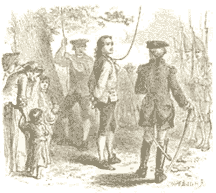Nathan Hale was born in Coventry, Connecticut, and educated at Yale. He volunteered for service at the outbreak of the War of Independence, participated in the siege of Boston and was promoted to the rank of captain.
Following the Continental Army`s ouster from Long Island, a pressing need was felt for information about British activities in New York City. In mid-September 1776, Hale volunteered to attempt to secure that intelligence.
Poor planning almost guaranteed the mission`s failure from the beginning. Hale was to act alone rather than as one of several spies dispatched for the same purpose; a multiple effort would have helped to ensure that some member of the team would return to headquarters with the desired intelligence. Further, Hale was handicapped by the absence of Patriot contacts in the city, the failure to plan an effective avenue of escape and by the total lack of reliable communication channels with the American army.
Perhaps the greatest impediment to success was Hale’s nature. He was regarded by his associates as exceedingly forthright and incapable duplicitous action — not characteristics usually associated with successful spies. His physical appearance also worked against him. Hale was said to have a handsome face, but one that bore evidence of powder burns that made him easy to identify.
Despite his friends` misgivings, Hale departed from the Continental Army at Harlem Heights and traveled to Norwalk, Connecticut. Then, dressed as an unemployed Dutch schoolmaster with his college diploma in hand, he secured passage across the Sound to Long Island. An exact recounting of his activities after this does not exist. He managed to work his way into New York City, gathered some information on the British soldiers there and make preparations for an escape. However, under confusing circumstances, Hale was captured on September 21. His notes and drawings were discovered hidden in his clothes; tragically, he had failed to use invisible ink, a technology available at the time. Forthright to the end, Hale admitted he was a Patriot soldier, an admission that sealed his fate. He had been out of uniform and operated behind enemy lines; under the existing rules of war he was subject to execution without trial. It should be noted that the British officers were especially uneasy about spies at this juncture because of recent fires that had ravaged the city and were thought to have been set by rebel agents.
 Hale was hanged the next morning and his body left on display as a warning to the community. Most traditional accounts of his execution cite the words, "I only regret that I have but one life to lose for my country," as his last. This paraphrase of a line from British writer Joseph Addison’s Cato, a play frequently performed in America, was quoted by one witness to the event. Another noted Hale’s dignified conduct, but did not mention those specific words.
Another matter of some controversy is the identity of the person who named Hale as a spy. Earlier accounts suggest that Samuel Hale, a relative in the employ of the British, may have informed British officers after spotting the `schoolmaster` in a tavern. Recently, however, a contemporary account of these events written by Consider Tiffany, a Connecticut shopkeeper and Loyalist, was obtained by the Library of Congress. In this rendition the finger is pointed at Robert Rogers, a hero of the French and Indian War whose sympathies later were clearly with the British. He is said to have found Hale to be an unconvincing teacher and lured him into his own betrayal, by pretending to be a Patriot spy himself.
Hale was hanged the next morning and his body left on display as a warning to the community. Most traditional accounts of his execution cite the words, "I only regret that I have but one life to lose for my country," as his last. This paraphrase of a line from British writer Joseph Addison’s Cato, a play frequently performed in America, was quoted by one witness to the event. Another noted Hale’s dignified conduct, but did not mention those specific words.
Another matter of some controversy is the identity of the person who named Hale as a spy. Earlier accounts suggest that Samuel Hale, a relative in the employ of the British, may have informed British officers after spotting the `schoolmaster` in a tavern. Recently, however, a contemporary account of these events written by Consider Tiffany, a Connecticut shopkeeper and Loyalist, was obtained by the Library of Congress. In this rendition the finger is pointed at Robert Rogers, a hero of the French and Indian War whose sympathies later were clearly with the British. He is said to have found Hale to be an unconvincing teacher and lured him into his own betrayal, by pretending to be a Patriot spy himself.